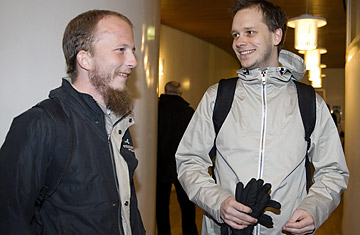
Pirate Bay co-founders Gottfrid Svartholm (L) and Peter Sunde arrive for their trial at Stockholm's city court February 16, 2009.
(2 of 3)
Similar cases have had their day in court in the U.S. Ever since Congress passed the Communications Decency Act of 1996, courts have let internet service providers off the hook for distributing obscene or otherwise illegal material. And Internet publishers, like newspaper sites, are ordinarily not liable for defamatory material contained in comments posted by readers. Google has been challenged here and abroad for the way it uses other sites' content on its Google News site. So far, though U.S. courts have sided with the search engine company, courts in other countries have seen it differently. Google lost a copyright case in Belgium brought by a consortium of photographers and journalists in 2007, and other suits are likely to proliferate. And while Swedish court decisions won't have any binding effect on cases in the U.S. or other countries, what happens in Stockholm is expected to become a bellwether in the ongoing fight over who owns the information on the Internet, especially given that Sweden, like the U.S., has tightened its anti-piracy laws partly in response to heavy pressure from the recording and entertainment industry. (See the 50 best inventions of 2008.)
For years ThePirateBay.org has been public enemy number one for the music business and Hollywood. By the time police raided the outfit's offices in 2006, the war of words — and legal threats — had been years in the making. And no wonder. The three main defendants certainly have Hoffman's flair for the dramatic, and more than a share of the late Yippie leader's propensity to stick it in the eye of the establishment. The site proudly displays its amassed correspondence from corporate lawyers who have written by the dozen to give notice of copyright infringement. Take this response in 2004 to complaints by the U.S.-based gaming software giant Entertainment Arts: "Hello and thank you for contacting us. We have shut down the website in question. Oh wait, just kidding. We haven't, since the site in question is fully legal. Unlike certain other countries, such as the one you're in, we have sane copyright laws here. But we also have polar bears roaming the streets and attacking people :-("
Two years ago, Peter Sunde, one of the men now on trial, told The Guardian of London that he and his partners feared nothing from the complaints. "We get legal threats every day, or we used to," Sunde said. "But we don't have a problem with them — we're just a search engine." His colleagues Gottfrid Svartholm Warg and Fredrik Neij are also on trial, along with a wealthy businessman accused of providing bandwidth and other support for the site.
But the companies that own the music and movies that The Pirate Bay's customers are downloading see it differently. "I certainly don't see them as romantic pirates: It's out and out theft," John Kennedy, top executive of the international music industry body IFPI, told The Guardian. Big-name artists, too, have weighed in. Prince has threatened to sue, and this week one of the founders of the Swedish super group ABBA denounced the site as a gift to those who want to be "lazy and mean." "It is easier and cheaper to steal than to download legally." Bjorn Ulvaeus wrote in an online Swedish op-ed. "Is it really so damn difficult to pay your way?"
Others are cheering loudly for the trio, though, including some lawyers and academics who have long argued that copyright law protects only the powerful, and helps maintain America's place as an exporter — for profit — of cultural works. If a movie is available in the U.S., why shouldn't a computer user in China get to see it too — even if the movie won't be released in his own country for months?
